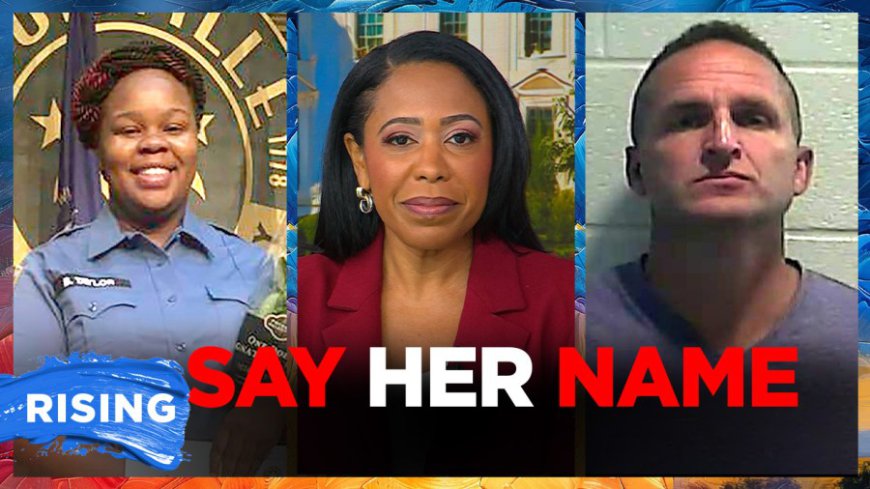Ex-officer who shot Breonna Taylor gets 3 years — but DOJ asked for zero?
This isn’t about anger. This is about humanity.

I have reported on injustice for years now. And every so often, a case cuts deeper — not just as a journalist, but as a Black woman.
Last night, that moment came again. A former Kentucky police officer, Brett Hankison, was sentenced to just under three years in prison for firing blindly into Breonna Taylor’s apartment during the botched 2020 raid that ended her life.
Here’s what activist and Attorney Benjamin Crump had to say about the sentencing: "And even though it’s not what we wanted — we thought that he should have gotten more time — we are grateful to Kristen Clark, Merrick Garland and the Department of Justice who had the courage for the first time in history to bring federal charges against a police officer for killing a Black woman in America/ And we are thankful that he is at least going to prison and has to think about Breonna Taylor and that her life mattered.”
The 33 month sentence came down after the judge outright rejected the Justice Department’s recommendation that former officer Hankison should serve no prison time. Imagine that: the Justice Department, the department that we — Black communities and all Americans — are told to trust for justice, suggested this officer’s crime was worth zero time behind bars.
I sat with that, because that’s not just a legal decision. That’s a message.
Breonna Taylor was a 26-year-old Black woman. An EMT. Someone whose literal job was to save lives. She could have been any of us. She was any of us.
She had plans. She had love in her life. She had a future. And all of that ended on March 13, 2020, because of a “no-knock” warrant tied to someone who didn’t even live at her address — because police fired without care or confirmation. She was killed because Kenneth Walker, her boyfriend, thought intruders were breaking in, and because our system didn’t value her enough to get it right.
They didn’t find drugs that they were supposedly looking for. They didn’t find evidence. What they found were lives destroyed.
What hurts, in this moment, is not just the injustice — it’s the pattern. It’s the normalization. And what’s more exhausting is having to explain why we’re still yelling Breonna’s name in 2025. We’re not chanting her name out of rage. We’re chanting it because we’re begging people to see Black women not as strong Black women, not as superhuman, not as invisible victims, but as whole human beings who deserve to live freely and safely, just like everyone else.
Too often, America doesn’t.
This country has always been a place where Black women's contributions are celebrated, but our lives are discounted. I have watched us hailed as “backbones” and “trailblazers,” while our disappearances go uncovered, our murders go unresolved, and our voices in the delivery room go unheard. We are either heroic or irrelevant — rarely human.
Even in Breonna’s death, that played out. There wasn’t outrage in every corner. There wasn’t unanimous support. There was division. There were justifications. There were quiet dismissals. “She was in the wrong place at the wrong time.” But no — she was in her own home. And still, it wasn’t safe.
I think about how different that night could have been if a little bit of care had been shown — if due diligence had been done, if police had simply knocked, announced themselves, and handed her a warrant addressed to someone else. She and Kenneth could have gone back to bed. She would still be here today, probably working a shift, saving lives.
Instead, her mother had to bury her child.
I don’t want to stand here, five years later, explaining this to our audience. But I have to, because the same country that tells me it’s too “divisive” to teach Black history in schools now tells me that Breonna’s life didn’t warrant accountability.
That’s the message when federal agencies scrub the word “oppression” from websites. That’s the message when museums are criticized for acknowledging racism. That’s the message when an officer who fired recklessly gets a recommended sentence of nothing.
And yet we’re told to move on. I can’t. We can’t.
This isn’t about anger. This is about humanity. Calling out Breonna Taylor’s name today isn’t a protest. It’s a reminder that Black women are human beings — complex, vulnerable, powerful, flawed, loving, dreaming human beings. Not afterthoughts, not martyrs, but people who deserve to be protected, remembered. And most importantly, who deserve to live like everybody else.
That’s why I keep saying her name: "Breonna Taylor."
Lindsey Granger is a News Nation contributor and co-host of The Hill’s commentary show “Rising.” This column is an edited transcription of her on-air commentary.
What's Your Reaction?
























